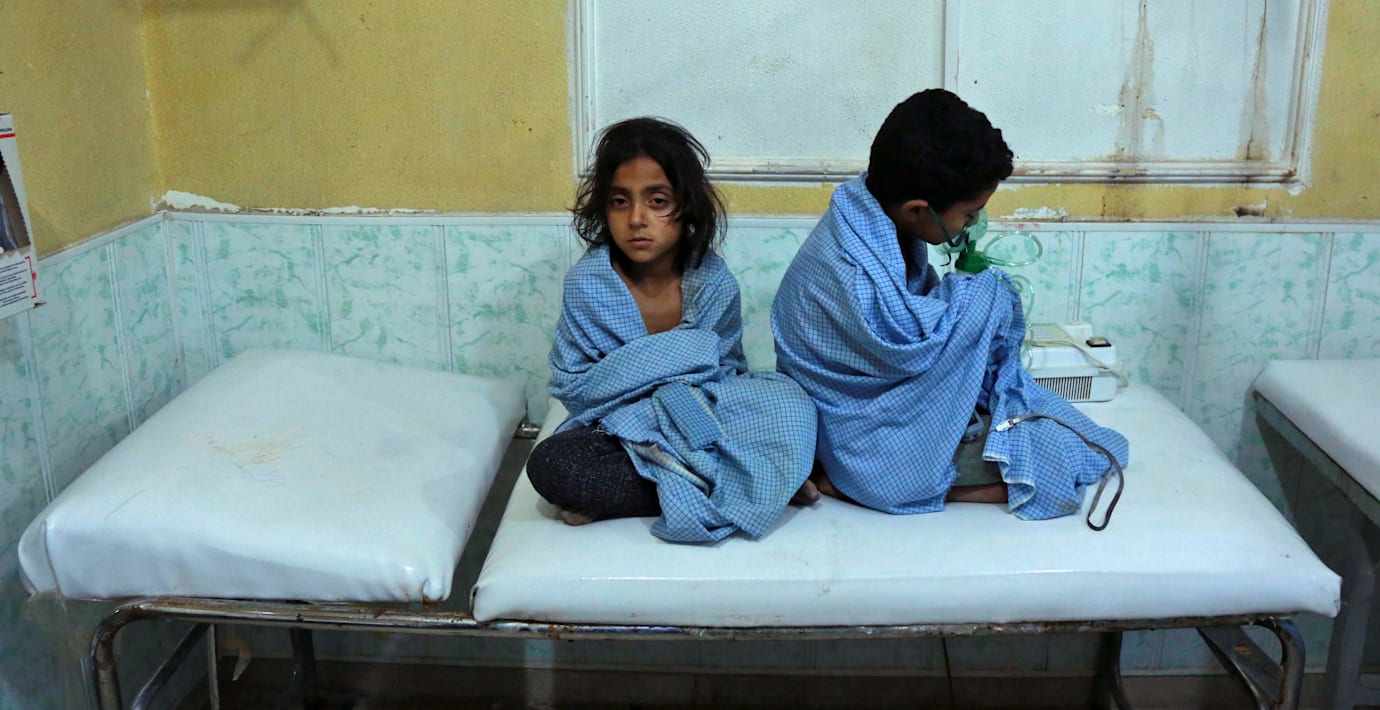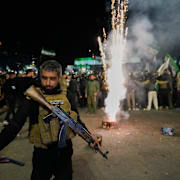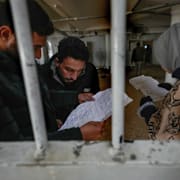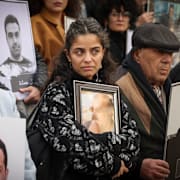
Hjälpkonvoj redo – väntar på besked från al-Assad
FN står redo med förnödenheter för 180 000 människor som kan skickas in i östra Ghouta så fort de får klartecken från president Bashar al-Assad. Det säger FN:s chef för humanitära insatser i Syrien, Jan Egeland, till Sveriges Radio Ekot.
Enligt FN-organet Unicef kan ett sådant besked komma i morgon, men Egeland säger att det fortfarande är oklart om Damaskus kommer att ge dem tillstånd att åka in i området.
– 45 lastbilar är klara, lagren är fulla med det de desperat behöver i östra Ghouta, säger han.
Han skickar också ett tydligt budskap till Syrien och Ryssland:
– Vi kan inte tolerera att 400 000 civila svälts ut i en militär belägring i närheten av Damaskus centrum.
bakgrund
Belägringen av östra Ghouta
Wikipedia (en)
The siege of eastern Ghouta is an ongoing siege that started in May 2013 during the Syrian Civil War. During the civil uprising in 2011, the east Ghouta population joined the protests against the Syrian president Bashar Al-Assad, who used military force to crack down on protestors, killing several people. This bloodshed militarized the people of east Ghouta who joined the Syrian rebels and expelled Syrian Government forces by November 2012 in the Rif Dimashq offensive. In February 2013, Syrian rebels even captured parts of the ring road on the edge of Damascus and entered the city's Jobar district. Backed by Iran and Hezbollah, the Syrian Arab Army counterattacked and started a siege of east Ghouta, turning it into an enclave. With almost five years, it is one of the longest modern sieges in history, and the longest siege in the Syrian civil war. It is longer than the siege of Sarajevo by a year. On 18 February 2018, the Syrian Arab Army launched a fresh offensive to capture the rebel-held territory of Ghouta. It is currently ongoing, despite attempts to implement ceasefire agreements by the United Nations.
In mid-2017, the main rebel faction in the area was Jaysh al-Islam, based in Douma (with an estimated 10-15,000 fighters in the region in early 2018). The second largest was Faylaq al-Rahman, an official affiliate of the Free Syrian Army (FSA), controlling much of central and western parts of Ghouta, including the Jobar and Ain Terma districts. Ahrar al-Sham (based in Harasta) and Tahrir al-Sham (HTS - controlling smaller districts such as Arbin, al-Ashari and Bait Naim, with an estimated strength in the area of 500 in February 2018) had a far smaller presence.
By 2016, around 400,000 people were trapped in an area just over 100 square kilometres in size, thus with a population density around 4,000 hab./km². During that time, the Syrian government subjected eastern Ghouta to a campaign of deliberate starvation and attrition. The denial of food as a military strategy began during July and August 2013: east Ghouta's crops and farms were shelled and burned. According to a 2014 United Nations report, Syrian forces "blocked access roads and systematically confiscated food, fuel and medicine at checkpoints". Some inhabitants had to rely on tree leaves as an alternative for vegetables to survive. The populace established a web of underground tunnels to smuggle supplies, but they were destroyed by the government forces. UNICEF Representatives said that at least 12 % of children under 5 were acutely malnourished in the enclave in early 2018. One UN aid arrived on 14 February 2018, after aid workers have had no access to the besieged city for 78 days, and only after water and sanitation, education materials and non-food items, were not allowed to be loaded in the convoy for relief efforts. The location was subjected to the 2013 chemical attack, killing hundreds of people, after which an agreement was made to ban chemical weapons in Syria. Despite efforts at turning Ghouta into an 'de-escalation zone', reports of bombs allegedly containing weaponised chlorine were registered again even in 2018. By January 2018, the area had only a single doctor per 3,600 people. On 7 December 2017, the United Nations Senior Advisor Jan Egeland called east Ghouta the "epicenter of suffering".
Despite the government's progress in the war after Russian intervention in 2015, and the occasional inter-rebel fighting, Ghouta, which is just 15 km or a half hour's drive outside the capital Damascus, remained contested and besieged. Due to its close proximity to the Syrian capital, the rebels from Ghouta were also accused of firing mortars at government-held central Damascus, killing several civilians. Hospitals in eastern Ghouta were shelled: Syrian army forces destroyed a field hospital in Al-Zemaniyah during a ground invasion in July 2013, while shells landed near Al-Fatih hospital, treating victims of the 2013 chemical attack, forcing it to discharge its patients. From 14 to 30 November 2017, the Russian-Syrian forces conducted more than 400 airstrikes in the area, indiscriminately bombing markets, schools and houses. During some of these airstrikes, banned cluster munition was used.
In December 2017, Satellite imagery analysis by UN experts concluded that 3,853 buildings were destroyed, 5,141 severely damaged and 3,547 moderately damaged in the western parts of the enclave. The suburb of Jobar was 93 % destroyed, Ein Tarma 73 % and Zamalka 59 %. In early 2018, the Syrian army started a new offensive: between 4 and 21 February 2018, its bombardments killed 346 people in eastern Ghouta. Local counts reported 700 deaths in the three months up to mid-February 2018. The escalation of hostilities drew pleas from international community to end the fighting and a United Nations Security Council meeting was held as a reaction on 24 February 2018, voting unanimously in favor of a 30-day cease-fire in Syria, and demanded immediate lifting of the siege of east Ghouta. Amnesty International has called the "unlawful siege and unlawful killing of civilians, including the use of internationally banned cluster munitions" by the Syrian government and Russia a war crime and a crime against humanity.
I remind all parties that the deliberate starvation of civilians as a method of warfare constitutes a clear violation of international humanitarian law, and may amount to a crime against humanity and/or a war crime. I also call on all those with involvement or influence in the conflict to facilitate the access of humanitarian workers so they can deliver the aid that the people of Eastern Ghouta so desperately need.
Omni är politiskt obundna och oberoende. Vi strävar efter att ge fler perspektiv på nyheterna. Har du frågor eller synpunkter kring vår rapportering? Kontakta redaktionen



